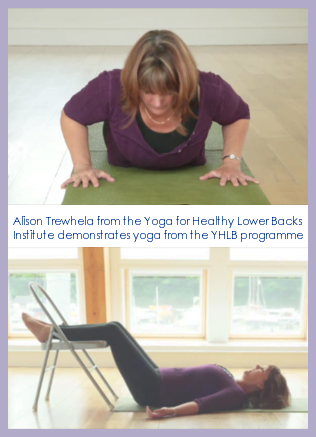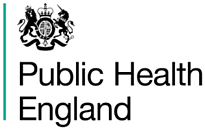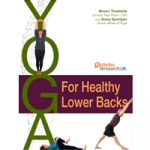 Guest blog by Alison Trewhela, Director of the Yoga for Healthy Lower Backs Institute
Guest blog by Alison Trewhela, Director of the Yoga for Healthy Lower Backs Institute
Evidence-based exercise for people restricted by back pain, fearful of movement, in considerable pain, or with other illnesses and injuries, ‘Yoga for Healthy Lower Backs’ (YHLB) is a gentle 12-week mind-body exercise programme offering a potentially life-long solution.
Public Health England has recently included YHLB as one of seven evidence-based MSK options in their PHE MSK ROI Return on Investment Interventions report and online tool. Healthcare and public sector commissioners and well-being providers are hereby more easily able to choose cost-effective innovative interventions. YHLB shows a £10 return on investment for every £1 spent.
The ‘Yoga for Healthy Lower Backs’ programme was born out of a large research collaboration of academics, health economists, yoga teachers and back pain specialists led by The University of York and funded by Arthritis Research UK. The 313-participant randomised control trial compared this yoga programme and usual GP care against usual GP care and evaluated back function at the end of the course as well as 12 months later.
The findings showed that YHLB was effective for chronic low back pain for the long-term (Annals of Int. Med., H. Tilbrook et al, Nov. 2011; Vol 15 No 9).
An economic evaluation showed that YHLB would be cost-effective within the NHS, was a dominant treatment for society, and that it reduced work absenteeism by 70% over the 12 months studied (Spine Journal, 15th Aug 2012, LH Chuang et al).
To share this research and knowledge, as the lead yoga research consultant and designer of the YHLB programme, I have trained over 400 experienced yoga teachers nationwide and, along with others, have set up a social enterprise and training Institute. Teaching teams and regional Hubs are being established to improve ease of access.
Our ‘best practice’ ‘Yoga for Healthy Lower Backs’ structured programme was designed to offer person-centred self-management support and advice. Uniquely, it is unparalleled in its strong evidence-base.
Attendees learn how to use strengthening, mobilising, stretching and pain-relieving poses, relaxation and breathing techniques and postural awareness exercises that aid a return to normal activity levels at work, home and leisure. They gain extra psychological support from group learning and benefit from positive ‘side-effects’, such as reduced time off work and improved mood.
Importantly, this is a specialised yoga course, designed for those with persistent, episodic or recurring back pain. However, it is equally true that if you have a lower back (!) and want it to be healthy, you can attend this gentle yoga course and learn how to help yourself to improved comfort, health and well-being for now and the future.
It is a ‘mind-body package of care’ that can easily be integrated into daily life. Offering a manual, relaxations CD, practice sheets and hand-outs, the 12 classes teach people to self-manage their back pain, whilst encouraging long-term changes in increased physical activity and improved well-being. A recent study showed that YHLB attendees had a 63% improvement in feeling able to manage their back pain by themselves.
 Through ARMA, we have been able to connect with many organisations in the musculoskeletal field with which we share similar goals. Through these connections, we are continuing to make progress in taking the results of the research out to those that it would most benefit, i.e. those with back pain, but also health professionals and commissioners.
Through ARMA, we have been able to connect with many organisations in the musculoskeletal field with which we share similar goals. Through these connections, we are continuing to make progress in taking the results of the research out to those that it would most benefit, i.e. those with back pain, but also health professionals and commissioners.
Amongst other regions, the YHLB programme is being successfully piloted by the NHS in Cornwall, as follows:
- GP surgeries (n=5) subsidizing course costs
- ‘Social prescribing’ scheme
- Subsidised courses for Primary Care staff
- Teaching Team and Regional Hub
The evidence from the research contributed significantly to the evidence NICE evaluated in their Guidance on low back pain and sciatica which mentions mind-body exercise, such as yoga, as a first step to managing low back pain.
In the light of the recent Government Paper Improving Lives, The Future of Work, Health and Disability, a social franchising model to take this successful and evidenced Yoga forward as an early intervention treatment option is being explored. The Government paper states “Early intervention and access to treatment and support were critical to preventing the progression of ill-health and preventing people falling out of work.”
One YHLB course attendee called it “a life-changing experience after years of frustration.”
As a specialist tutor for Yoga and Research at University of Exeter Medical School, I know how hard is has been in the past to find yoga programmes with strong evidence-base, so all this is fantastic news for those with back pain, referrers and commissioners.
Further information at www.yogaforbacks.co.uk or email YHLBInstitute@gmail.com

